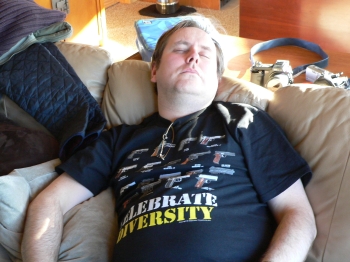We are developing the social individualist meta-context for the future. From the very serious to the extremely frivolous... lets see what is on the mind of the Samizdata people.
Samizdata, derived from Samizdat /n. - a system of clandestine publication of banned literature in the USSR [Russ.,= self-publishing house]
|
Finally someone has explained to me why such as fuss is made, and not just by idiot Frenchmen, about the military genius of Napoleon.
All I have seen for the last forty years or so is a very self-important general who liked presiding over slaughters, sometimes of the other fellow’s army, sometimes of his own, and frequently both. I have seen a land-locked leader who was comprehensively defeated by Nelson several times. And I have seen a hubristic fool who invaded Russia, with catastrophic consequences. Okay he also won several battles, and wrote out lots of laws. But why the adulation?
Recently, however, I have been reading General Sir Rupert Smith’s new book, The Utility of Force: The Art of War in the Modern World.
Reading the Introduction was sometimes a little like wading in lead boots through treacle. It contains sentences like: “Force is the basis of any military activity, whether in a theatre of operations or in a skirmish between two soldiers.” “Military force when employed has only two immediate effects: it kills people and destroys things.” And: “Military force is applied by armed forces of men, materiel and their logistic support.” Even a civilian like me knows these things, although to be fair to Smith these thudding revelations of the obvious immediately become the basis of distinctions and qualifications that were more subtle.
However, as soon as Chapter One got started, things livened up considerably. And Smith began his story proper with: Napoleon.
What made Napoleon different was that the French Revolution had created something quite new, in the form of a vast and almost infinitely replenishable army of conscripted citizen enthusiasts, rather than the human farm animals who were herded into battle by his contemporaries. Eighteenth century infantry tactics were as much about preventing desertion by one’s own soldiers as they were about defeating the other lot, which does much to explain why actual battles were generally avoided and manoeuvre and negotiation were often all that happened in pre-Napoleonic military confrontations.
Besides which, in the eighteenth century, armies were hard to replace. They did not flock to any banners. They had to be chased after and caught.
Napoleon did not invent the solution to this problem, but the Revolution presented him with it, and he seized upon it.
This is the bit of the story I never did properly understand, and I guess I still do not. What was the big difference between being a subject and being a citizen? Some non-aristocratic thug standing on a balcony bellowing at you that you were now a “citizen”? Big deal. But apparently, in those days, it was a big deal. In exchange for this title Napoleon’s citizen army became something quite new.
Napoleon realised that, provided that he looked after his men – fed them properly, clothed them properly, and so on – he could demand of them things that his rivals could only dream about. In exchange for such solicitousness, Napoleon was able to split his vast citizen army into independent corps, each able to fight on their own, and trust them to do as they were told and not to run away. While his opponents could manoeuvre only as one docile mass, his armies would split up and march this way and that (which also made them a lot easier to supply because this made foraging so much easier), like a Kung Fu master waving his hands hypnotically, and only converging on what Napoleon decided would make a good battlefield on the day of the battle itself.
Once there, Napoleon was not afraid to get stuck into a pitched battle, because unlike the opposition, he could whistle up another army in the event of defeat, or for that matter of costly victory. Apparently his fellow “citizens” did not mind this. Risking death, in exchange for “gloire” was, they reckoned, a good deal. Fighting for Napoleon was like playing football for Brazil, in an age of mud-bound cloggers. Dying was worth it, because until then, you lived! Was that it? I do not really know.
Even after the amazing Russian fiasco, Napoleon was still able to magic another army together out of nowhere, and have another crack at the coalition that confronted him from 1813-1815. As Smith himself points out, this was truly remarkable.
So I guess I still do not fully understand Napoleon’s achievement. But thanks to General Smith, I have, as it were, isolated the bit of the story that is still a mystery to me. And once I take that bit on trust, the rest of the story falls into place.
Maybe me not fully understanding the “citizen” bit is because, as Smith has already made very clear, the “paradigm” of industrial warfare that got started with Napoleon is now, in his opinion, in a state of advanced crisis, and is in fact pretty much history. It was this paradigm shift argument that got me interested in this book in the first place, and why I intend to press on until I have finished it, despite any further treacle I may encounter. General Smith is, I think, a man worth following, through a book anyway, and the price of following him is worth paying.
Smith apparently played a big part in the Balkans in the nineties. I wonder what he did there, and what he will say about it. And I wonder whether Perry de Havilland approves of this man or has in the Spawn of Satan box, in the company of people like Harold Pinter.
Whilst on my recent trip to the USA, I saw a computer game called Cold War that looked interesting. I am sooooo tired of brainless run-n-gun FPS games that this looked like something work trying.
Alas, once I got back to Britain and started to install the game, I saw that it was about to install StarForce copy protection.
So I hit cancel, removed the disc from my computer and threw the game in the rubbish bin where it belongs. Most annoying is that nowhere on the box does it say that the game uses StarForce.
Why does that matter? Well a few months ago, my nifty and hitherto perfect Alienware computer suddenly died without warning a few hours after I installed Splinter Cell 3, which also uses StarForce copy protection. Am I certain StarForce was to blame? No, I am not but I am bloody suspicious and not without good cause. I wish I had thought to check this site before I dropped $39.99 because I would have never purchased it if I had known.
Is the new-and-improved StarForce better at not blowing up your system than the previous versions? I am not sure but it only has to happen once for me to never ever allow a firm’s products on my hard drive again. If a games company wants my money, it had better find a way of protecting itself that does not put my operating system at risk because there are plenty of other games out there to choose from.
I would recommend you not make the same mistake I just did. Spend your money on something else.
It is a great shame to see Randy Cunningham, a fighter ace who did sterling work over North Vietnam, descend into the cesspool of corruption like so many before him. My opinions of the man were already diminished by his blinkered views regarding the excesses of Serbian nationalism but to see this old warrior revealed as utterly corrupt is still deeply saddening.
It is equally revolting to see Democrats act as if this is the special preserve of the Republican Party rather than an endemic feature of the whole process of which they too are very much a part. Taxpayers for Common Sense has some rather more non-partisan views:
Keith Ashdown, of Taxpayers for Common Sense, a watchdog group, said Cunningham’s guilty plea hurts both parties. “There are very few things that I read that kick me in the gut. This is beyond my wildest guess of how bad it actually is — how bad, how long and how nobody knew about it,” said Ashdown. “I don’t think Democrats or Republicans win on this. It basically makes people detest Congress even more and deters voter turnout.”
In truth the only way to reduce corruption in high places is to have less high places and which party is on top makes very little difference.
It is always fascinating to watch one’s enemies twisting and turning on the spiky contradictions of their own ideology. It is also rather interesting to see your enemies turning on each other.
As Lord May of Oxford put the boot in to environmental activists during his speech to the Royal Society:
[He] said that environmental campaigners risked holding back the fight against climate change with an absolutist approach that refused to consider nuclear power.
“I recognise there are huge problems with nuclear, but these have to be weighed against other problems,” Lord May said. “This has to be recognised as a problem by what you might call a fundamentalist belief system.
And we also get to see Tony Blair’s speech to the Confederation of British Industry being disrupted by Green activists.
The Greens say we must reduce greenhouse gas emissions and yet when the government tries to adopt nuclear power to do exactly that, the Greens are up in arms.
Face it, unless the world agrees to regress to a pre-industrial level of technology with commensurate mass death of ‘surplus’ modern levels of population, the Greens will never be satisfied. Never mind that most climate change is probably caused by natural processes.
At least these guys are honest about what they really want.
The European Union wishes to legalise the retention of data from telecoms operators and ISPs for the period of one year. We are told that the retention of data will allow governments to conduct counter-terrorist campaigns more successfully and prevent other serious crimes. The retained data could be used in these investigations.
The Creative and Media Business Alliance have lobbied the European Parliament to extend the provisions of the proposed Directive. Data would be used for investigations into copyright infringement and, if other new laws come to pass, infringements of intellectual property.
But the Creative and Media Business Alliance (CMBA), a group of media companies including EMI, SonyBMG and TimeWarner, has lobbied the EU to allow this data to be used to investigate all crimes, not just serious offences such as terrorism.
Opponents have claimed that if this demand was granted, then — combined with the upcoming IPRED2 legislation which could create Europe-wide criminal offences for intellectual property infringement — the entertainment industry would be able to pursue prosecutions against suspected copyright-infringers through the criminal court entirely at the cost of the taxpayer.
Whilst intellectual property is always a tricky and contested subject, the music media is treading that famous path of fighting disruptive technology by lobbying for a secure monopoly. Only Europe is stupid enough to let them.
It is not hard to understand why the government does not regard mugging as so serious a crime that it should always lead to a jail sentence, provided “minimal force” is used.
As the government have long made it clear that people should not defend their property with force against people who try to take it by force, they regard just handing your money and goods over as sensible and responsible behaviour. In short, they think the way to prevent violent crime is to stop people resisting and therefore remove the need for muggers to use actual violence rather than just the threat of it.
In other words, they want to make muggers more like tax collectors. Is that really so surprising?
The price of gold on the world commodities market is at the highest level since December 1987 (god that seems a long time ago). A number of reasons are given for why it is so strong, such as being a default resting place for investors who are shy of holding stocks, bonds or cash. Gold is also strong because commodity prices in general, such as nickel, zinc, iron ore and bauxite are being driven higher by the voracious appetite for metals and other goods by China.
There may be another factor, though, which ought to set off a few red lights in the central banks. Gold is often a hedge for people against inflation. It seems a long time ago when Britain endured double-digit inflation, but inflation is creeping higher, although that may be simply due to the temporary effects of higher oil prices. Anyway, the gold stuff may be issuing a gentle warning. Let’s hope the Bank of England takes note of it.
Yesterday I chanced upon a short interview on some children’s TV type show called T4, with the actor James Purefoy. ‘Purefoy’ is, I now finally know, pronounced ‘pure-foy’, rather than “pure-i-foy”, which I have often wondered about.
Anyway, James Pure-foy is playing Mark Anthony in the hit TV series, Rome, and one of the things he said struck me as really rather illuminating. He said that the difference between us and the Romans was that they regarded weakness as a vice and what we would call cruelty as a virtue.
To many readers here this will seem a banal and obvious observation, but I have never heard it put quite like that, or if I ever have I was not paying attention. Perhaps the clarity of this observation can be attributed to the fact that although the actors in this series are British, the producers are Americans. Americans do love to nail down in a few words what a show is all about. (Until Purefoy went on to say this, I did not even know that Rome was an American production rather than British.)
This cruelty-is-a-virtue meme pulls together lots of different things about the Romans that have never previously made proper sense to me. Basically, why were they such total and utter bastards, and at the very same time so amazingly smug about how virtuous they were? Did they like torturing each other, and even being tortured? Answer: no. But they did believe in it. They were not indifferent to pain. They believed in pain. They believed in inflicting it, and believed that being able to endure it was one of the highest virtues. A lot falls into place once you (by which I mean I) get that.
Given the kind of world that the Romans inhabited, you can see how such beliefs would answer the Darwinian necessities of that time. But perhaps because the Roman political system had such a modern feel to it, the ancientness of their ethical beliefs seems somehow jarring. But yes, the Romans spent a lot of their time ? in particular a lot of their education ? actively trying to be more cruel than their natural inclinations inclined them to be. (See also: Sparta.) → Continue reading: Roman virtues and vices… and ours
100 years ago, Albert Einstein formulated the equation E=MCSquared, that expresses Einstein’s theory that as one accelerates an object, it not only gets faster, but gets heavier. I must admit it is not very often that I come across the anniversary of a theory like this. We normally mark dates of births, deaths, battles, elections or great reforms. Theories don’t quite have the same resonance. I don’t imagine that there will be grand parades marking Einstein’s achievement.
I have read a bit about this incredible man and his life, and to this day I’ll frankly admit to finding it pretty hard to get my head around some of the ideas of relativity. (Physics was never one of my stronger subjects, something I intend to fix at nightschool. Never too late to learn). But there can be no doubt at all about the impact this man has had on the subsequent 100 years, in terms of our understanding of the universe and of course in fields such as nuclear power, both in its benign and not-so-benign forms.
And Einstein of course is incredibly famous not least for personifying the “eccentric genius” with his mass of scruffy hair, wild-eyed expressions and casual manner. How often are scientists in the movies, television and theatre portrayed in this way (assuming that scientists are portrayed at all). More recently, the late great Richard Feynman continued the tradition for iconoclastic irreverence, famously deflating science establishment in a marvellous collection of books about science and public policy.
For those interested in Einstein’s contemporaries in the science community in America, I can strongly recommend this book by Ed Regis.
The press plagarist of the year competition is in its final round. Go and vote for the worst blog content pirate…
Some of the Samizdatistas have been in the USA for Thanksgiving, much to the consternation of the turkey population, given that we are all members of PETA (People for Eating Tasty Animals).
As for much of the time we have been in the wilds of Pennsylvania without an internet connection (the horror, the horror), we have been unable to post about our various jolly japes in the Land of the Free.

We were releaved to have made it out of the People’s Republic to the relative safety of the Keystone State

I could hear the turkey’s crying “The British are coming! The British are coming!”

An Armalite toaster? Is this country great or what!

The womenfolk in these here parts are made of stern stuff

Getting ready for Thanksgiving Dinner with twenty friends: the quintessential American experience

Celebrating dangerous (thankfully) right wing extremists

Vast mounts of turkey washed down with red wine: tryptophan overdose!

A local family tradition: eat the turkey and then take the young ones out and show them how the turkey ends up on the plate

One of the Samizdata editors goes looking for those turkeys who ratted us out earlier. The British are coming and this time they are armed and pissed off. Good food, great people and things that go boom. Damn I love this place.
We will be back in London soon. Bugger.
It has been a sad few days in British sport, which has lost arguably the most talented football player these islands have produced in George Best. He died, as many people will know, a few years after having a liver transplant necessitated by a long history of alcohol abuse. For those unfamiliar with his story, he was born in Belfast and played at Manchester United in one of its most successful periods in the mid- to late 60s but left top-class football aged only 27.
I am glad that in most of the coverage about him, the focus has been on the football rather than the messy personal life. And what a fantastic player he was! If even Brazilian maestro Pele called him the greatest player in the world, then who are we to demur? I was born in the year – 1966 – that Best gave what aficionados and team-mates reckon was Best’s finest display, demolishing Portugese side Benfica with two goals, the second involving a mazy run past several defenders before sticking the ball into the back of the net.
Best was an alcoholic, which some people regard as a disease that one is born with rather than a condition over which people, possessed of free will, have control. Interestingly, I get the impression, by reading some of Best’s own remarks, that he was a man in control of his own destiny and did not, as far as I am aware, choose to play the victim card. There is no doubt, though, that some people have found it hard to conquer the bottle, although others, such as Tottenham soccer ace Jimmy Greaves, managed to give up on booze and preserve their health and live into a ripe old age.
Anyway, I expect DVDs of Best’s football brilliance to be hot sellers this Christmas. May he rest in peace.
|
Who Are We? The Samizdata people are a bunch of sinister and heavily armed globalist illuminati who seek to infect the entire world with the values of personal liberty and several property. Amongst our many crimes is a sense of humour and the intermittent use of British spelling.
We are also a varied group made up of social individualists, classical liberals, whigs, libertarians, extropians, futurists, ‘Porcupines’, Karl Popper fetishists, recovering neo-conservatives, crazed Ayn Rand worshipers, over-caffeinated Virginia Postrel devotees, witty Frédéric Bastiat wannabes, cypherpunks, minarchists, kritarchists and wild-eyed anarcho-capitalists from Britain, North America, Australia and Europe.
|












